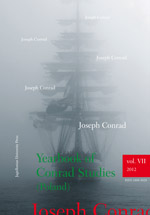Joseph Conrad in the light of postcolonialism
Joseph Conrad in the light of postcolonialism
Author(s): Daniel VogelSubject(s): Literary Texts
Published by: Wydawnictwo Uniwersytetu Jagiellońskiego
Keywords: An Outpost of Progress; colonial literature; Chinua Achebe; colonialism; Congo; Heart of Darkness; Joseph Conrad; postcolonial literature; postcolonial studies; postcolonialism; racism
Summary/Abstract: This article consists of two parts. The first part presents the main concepts and facts connected with the development of postcolonial studies as a relatively new academic discipline, while the second part discusses Conrad’s two ‘African’ works, which — containing as they do an implicit critique of colonialism and imperialism — are now seen as being one of the very first ‘postcolonial’ books. Over the last thirty years, postcolonial studies have not only gained the status of an academic discipline, but have become one of the main schools of literary criticism. The postcolonial approach is also critical towards those systems of presenting the world that have existed for decades and have thus come to be regarded as being natural; it undermines their position and shows that they are nothing but ideological discourses which have been created by world empires. To a great extent, postcolonial theory has relied on existing theories for its methodology and terminology. On the one hand it relies on Marxism, while on the other it leans towards poststructuralism and postmodernism. Postcolonial theory also participates in discussions concerning the position of the Other (Spivak). As well as outlining the framework of postcolonial theory, it is important that we define such terms as ‘colonial’ and ‘postcolonial’ literature. In her book entitled Colonial and Postcolonial Fiction (1995), Elleke Boehmer suggests limiting the field of research in order to concentrate on the modern colonial empires that have emerged over the last four or five centuries, laying particular emphasis on the British Empire, as it was here that the greatest textualization of the idea of colonial expansion took place. The terms ‘colonial’ and ‘post-colonial’ are understood differently in The Empire Writes Back (1989), whose authors (Bill Ashcroft, Gareth Griffiths and Helen Tiffin) suggest that the the term ‘post-colonial’ should refer to all cultures affected by imperial expansion — from the beginnings of colonization to the present day — arguing that the expansion of colonial empires in previous centuries exerted a considerable influence on historical processes that have lasted down to our own times. Because these definitions of post(-)colonial literature do not encompass such phenomena as the literatures of multicultural metropolies or literatures going beyond the realm of the English language or beyond the literature of British or French colonialism, critics now often prefer to use expressions such as ‘literature in English’, ‘French-language literature’ or ‘literature of the Caribbean’ (which indicate the language or the region where a given type of literature has emerged) instead of the term ‘postcolonial literature’. Most contemporary scholars see Conrad as being one of the first postcolonial writers — someone who criticized the ruthless colonial expansion of European empires and the concept of the “White Man’s Burden”. The works which attract particular attention are, of course,
Journal: Yearbook of Conrad Studies (Poland)
- Issue Year: 2012
- Issue No: VII
- Page Range: 97-112
- Page Count: 16
- Language: English

